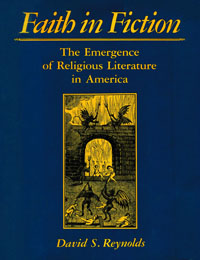Faith in Fiction
Faith in Fiction: The Emergence of Religious Literature in America
by David S. Reynolds
. Cambridge, MA and London: Harvard Univ. Press, 1981 (reprint 1984).

A wide-ranging investigation of American religious culture and some 250 writers in the age from Jonathan Edwards to Emerson and beyond.
“A pioneering work…..An interesting and important book.”
—Nina Baym, Journal of English and Germanic Philology
About the Book
The first full-length study of early religious fiction from the Revolution to the Civil War, this book explores a long forgotten genre of writing. Ranging over the fiction of some 250 American writers, Reynolds provides an overview of the bestsellers of their time and the popular culture of the period. The literary movement he traces began as a cautiously allegorical one, and he finds that it evolved into a fairly realistic genre by the mid-nineteenth century. This shift from the metaphysical to the earthly was abetted by the authors’ uses of a variety of appealing modes: the oriental and visionary tale, historical fiction on biblical themes, and the domestic novel.
Reynolds’ study addresses several questions: When did religion first appear in American fiction, and why was the novel increasingly chosen as the appropriate literary mode of popular inspiration? How could theology become entertainment? In what sense does the rhetorical strategy of this fiction reflect changing ways of religious discussion? How can the sermons, essays, or memoirs of the early writers help us to understand the themes and techniques of their fiction?
This is the only book on the popular religious aesthetic between the age of Jonathan Edwards and Emerson. Some authors discussed are: Jonathan Edwards, Benjamin Franklin, Charles Brockden Brown, Susanna Rowson, Nathaniel Hawthorne, Ralph Waldo Emerson, Catharine Sedgwick, Lydia Maria Child, Robert Montgomery Bird, Sylvester Judd, William Ware, Orestes Brownson, Harriet Beecher Stowe, Susan Warner, Maria Susanna Cummins, Henry Ward Beecher, and George Lippard, Elizabeth Stuart Phelps Ward, and Mark Twain.
“This book escapes from the worn-out definition of American literature as consisting of a handful of masterpieces, and to find out instead what the American scene was really like….Students of American culture and literature will need to read this book. So, too, ought students of narrative theory and genre to consider it.” –Nina Baym, Journal of English and Germanic Philology
“A useful and important book… Faith in Fiction deserves careful reading by students of American religion, literature, and culture…Reynolds’s capacity for close reading and his control over his subject enable him to pry open quick and provocative insights into what certain elements of religious fiction can reveal and to propose how such disclosures can refine the understanding of this era in American cultural and religious life….The book is abundant with episodes of Reynolds’s interpretive acumen….Reynolds maintains balanced views, alert analyses, and thorough coverage with his focus” –The Journal of Religion
“A valuable and timely book…An intriguing and important study not only for its treatment of writers and works not often read and considered, but for the backgrounds and resonances they provide for an understanding of those great nineteenth-century American writers—Hawthorne, Melville, Emily Dickinson, and others….Reynolds’s concern and conclusions deserve the attentiveness of all serious students of American literature, culture, and religious history.” –New England Quarterly
“A critical study both dependable and provocative…Reynolds has many perceptive points to make, insights that a thoughtful reader will wish to ponder….His observation that Brockden Brown was the first novelist to make religion a psychological rather than a doctrinal literary matter, and thus stands at the head of a tradition of writers that includes Poe, Hawthorne, and James, is astute and suggestive.” –Ann Douglas, American Historical Review
“A valuable work of American intellectual history.” –American Literature
“An essential contribution to scholarship—one of considerable value to students working on many aspects of American intellectual history roughly between the Revolution and the Civil War.” –Alan Heimert, Harvard University
